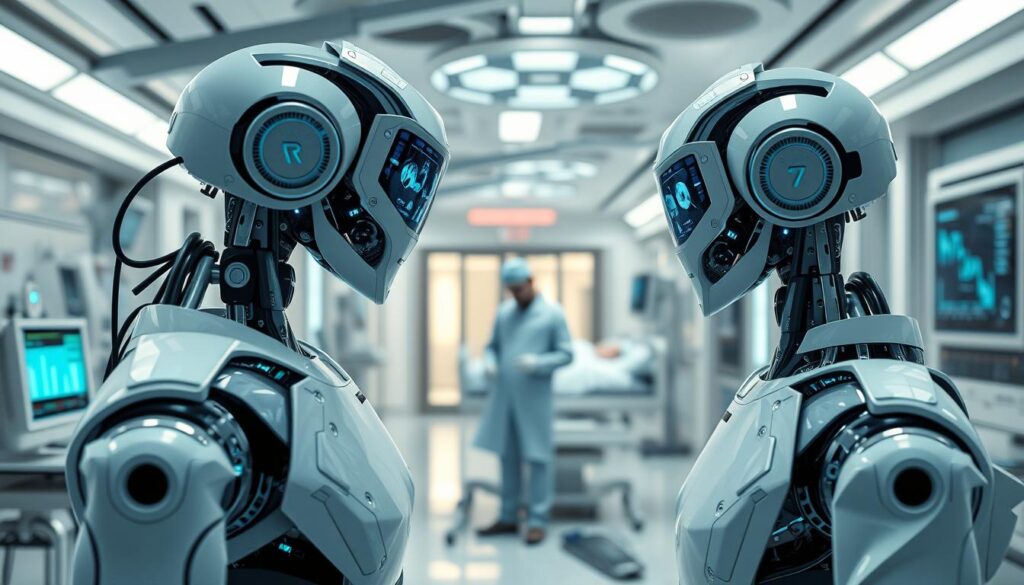By 2035, AI could add a whopping 957 billion USD to India’s economy1. This shows how much AI is changing healthcare worldwide. AI is making medical care better and helping with a big problem: not enough doctors.
In India, 74% of doctors work in cities, but only a quarter of the population lives there1. Medical robots could really help with this problem. The healthcare world needs 2.3 million doctors by 2030 to meet the World Health Organization’s standards1.
Robotics and AI are making big changes in healthcare. They help with diagnosis, surgery, and managing hospitals. The medical robots market is set to hit $12.7 billion by 20252.
This growth shows healthcare is moving towards new solutions. The COVID-19 pandemic made AI and robotics in healthcare even more important. They help make things run smoother1.
Key Takeaways
- AI is projected to significantly enhance economies globally, including healthcare sectors.
- The healthcare industry will need millions of additional professionals by 2030.
- The global medical robots market is expected to grow significantly in the coming years.
- AI and robotics are crucial in addressing healthcare delivery challenges.
- The COVID-19 pandemic showcased the urgent need for AI applications in medicine.
- Medical robots like the TUG assist with logistics in hospitals, elevating efficiency.
Introduction to AI and Robotics in Healthcare

Artificial intelligence and robotics are changing healthcare. They make services better and help patients more. Digital health solutions are key to this change, making healthcare more accessible.
A search found 553 records, with 463 articles reviewed. This shows how fast AI is growing in healthcare. In the end, 45 papers were chosen to highlight the latest advancements. This shows AI is becoming a big part of healthcare3.
AI is making surgeries better. For example, AI models can analyze surgical videos well. They can spot safe areas during surgery with high accuracy3.
AI tools can also predict when diseases might come back. They help doctors create treatment plans that fit each patient. This shows AI’s role in handling complex medical cases4.
AI is also used to look at lots of patient data. This helps doctors make better decisions. The idea of P5 medicine—predictive, personalized, preventive, participatory, and precision care—benefits a lot from AI. It shows we need AI that can adapt and work with other systems4.
The Rise of AI Robots in Medical Settings
AI robots have changed healthcare a lot, making it more efficient and effective. The market for medical robots is expected to hit $12.7 billion by 2025. This shows how much we rely on robots in healthcare now5. These robots help make surgeries better and do routine tasks, so doctors can spend more time with patients.
AI robots help make patient care better. They help doctors understand patients’ daily lives, giving them personalized advice5. For over 30 years, robots have helped in surgeries and managing long-term health issues. They are key in improving medical care6.
AI also helps reduce mistakes in healthcare. In the U.S., over 250,000 people die each year from preventable medical errors. AI could help lower these numbers6. Plus, AI helps doctors plan care better, making healthcare more efficient7.
How are AI robots used in healthcare?
Artificial intelligence is changing healthcare by combining with robotics. This mix improves medical practices and health results. Surgical robotics is key in medical settings, especially for complex surgeries needing surgical precision.
The da Vinci Surgical System makes robotic-assisted surgery easier. It lets surgeons work on hard-to-reach areas with great accuracy. This shows how technology and medicine work together to improve patient care8.
Enhancing Surgical Precision
AI robots bring big improvements in surgical accuracy. Hospitals see fewer complications and less pain after surgery9. Surgeons also feel more comfortable, thanks to better ergonomics.
This leads to more surgeries without overworking healthcare staff. It highlights the important role of surgical robotics in today’s healthcare.
Assistance with Minimally Invasive Surgeries
AI robots help a lot in minimally invasive surgery. They let surgeons do operations with smaller cuts. This means patients recover faster and spend less time in the hospital.
Robotic exoskeletons also help in rehab, helping patients get stronger and move better after surgery8. AI robots improve surgery results and offer better rehab plans. This makes the patient’s journey through healthcare smoother9.
Types of AI Robots in Healthcare
The healthcare world is changing fast, thanks to medical robots. These robots come in different types, each helping in unique ways. They make patient care better and work more efficiently.
Surgical-assistance Robots
Surgical robots, like the Da Vinci Surgical System, have changed surgery for the better. They offer precise and less invasive surgeries. This has led to more successful surgeries and fewer infections10.
Intuitive Surgical leads the field, making over $6 billion a year. This shows how much the technology is growing and improving10.
Service and Logistics Robots
Service and logistics robots help with everyday tasks in hospitals. They restock supplies, take out trash, and clean areas. This is especially important during the Covid-19 pandemic for safe cleaning11.
These robots free up staff to focus on caring for patients. This makes a big difference in patient care12.
Social Companion Robots
Social robots in healthcare interact with patients on their own. They offer friendship and keep minds active. They help the elderly and kids, making sure they stick to their treatment plans11.
These robots also help with mental health. They make people feel less alone12.
FAQ
How are AI robots transforming healthcare delivery?
What are some applications of AI in surgery?
What types of AI robots are currently utilized in healthcare?
What is the expected market growth for medical robots?
How is AI addressing healthcare accessibility issues?
What are the benefits of using service and logistics robots in hospitals?
How can AI robots assist the elderly in healthcare?
Source Links
- https://pmc.ncbi.nlm.nih.gov/articles/PMC10287569/
- https://www.ahu.edu/blog/robotics-in-healthcare
- https://www.ncbi.nlm.nih.gov/pmc/articles/PMC10907451/
- https://www.frontiersin.org/journals/medicine/articles/10.3389/fmed.2022.795957/full
- https://www.pwc.com/gx/en/industries/healthcare/publications/ai-robotics-new-health/transforming-healthcare.html
- https://online-engineering.case.edu/blog/medical-robots-making-a-difference
- https://www.facs.org/for-medical-professionals/news-publications/news-and-articles/bulletin/2023/june-2023-volume-108-issue-6/ai-is-poised-to-revolutionize-surgery/
- https://www.forbes.com/sites/williamhaseltine/2023/09/29/the-synergy-of-artificial-intelligence-and-robots-in-medical-practice/
- https://builtin.com/artificial-intelligence/artificial-intelligence-healthcare
- https://vanguard-x.com/ai/ai-robots-in-healthcare/
- https://www.brainlab.com/journal/types-of-medical-robots-in-use-today-and-in-the-future/
- https://standardbots.com/blog/10-ways-robotics-are-being-used-in-healthcare-today?srsltid=AfmBOorGDiVvG-ZgJjX_j7wCj3DC1RCXw8H8Xz0kJihsEYEvThkCXDiP






